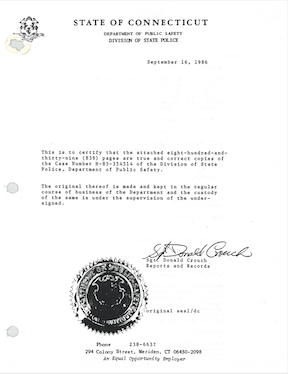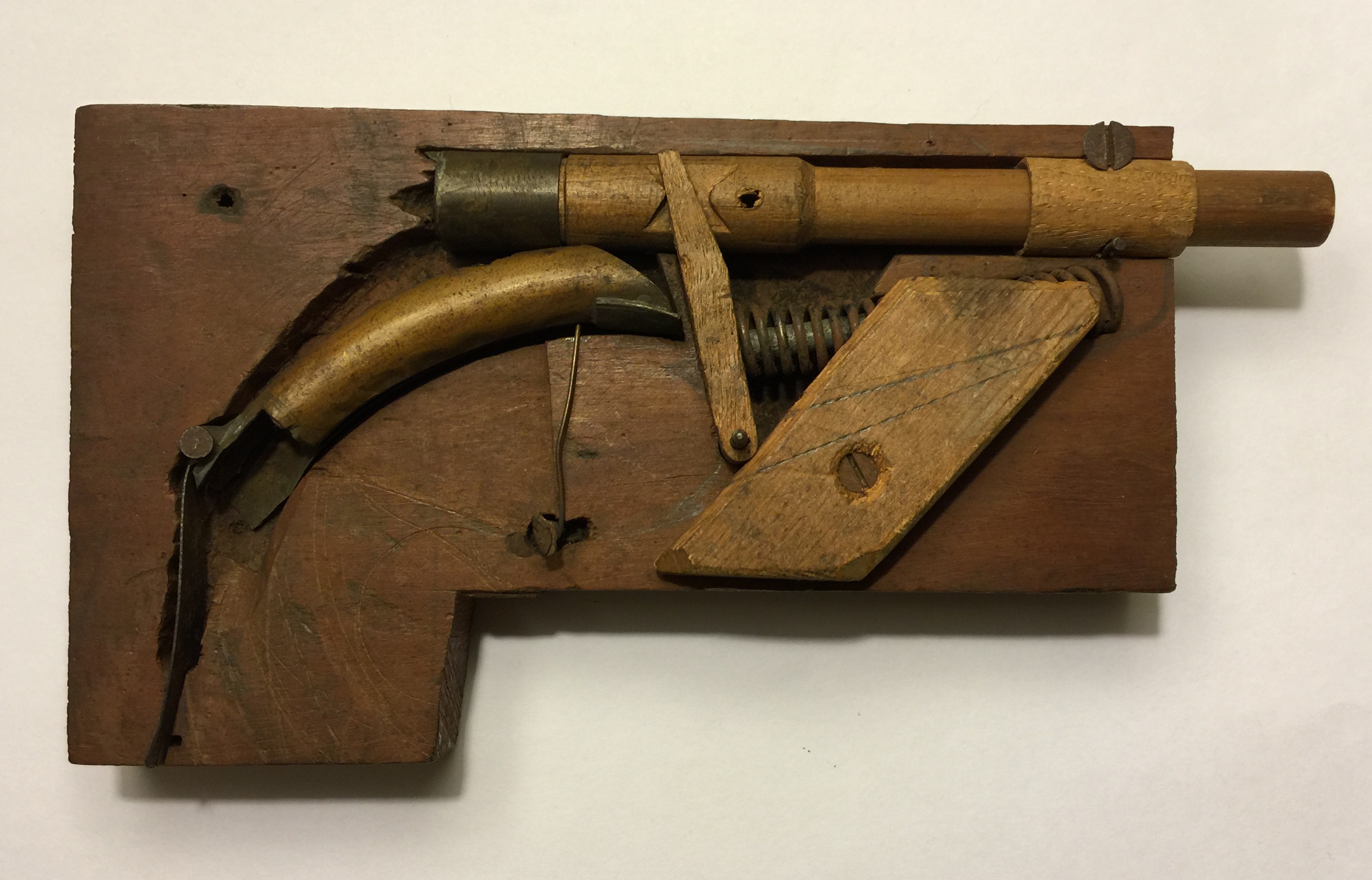R.L. Wilson was a pillar of the firearms collecting community, and especially the Colt collecting community, in the 1970s and 80s. He wrote a slew of books on Colt, and was a major broker, dealer, and appraiser. He also betrayed the trust people put in him, as best exemplified by the “trade of the century”, in which he swindled 290 firearms out of the Connecticut State Library museum in exchange for 8 guns and a cane (including two stolen guns and two later generally accepted to be fakes). Today we will talk about that story…
If you want to hear more about Wilson’s work, I would encourage you to subscribe to support C&Rsenal on Patreon, and check out the two-hour podcast Othais and Cody Museum Associate Curator Danny Michael did on the topic.
You can also download a huge PDF of Connecticut State Police files on the investigation to read yourself:





Wow. I hadn’t heard of this.
Where there’s smoke there’s almost always a hint of fire, to mangle a phrase.
You need to speak with Bruce Kaufman of Phoenix Arizona.
His late father Larry Kaufman had all the original case paperwork from the Wilson caper . Larry Kaufman is the documented person who discovered this heinous crime. Ron dean a noted colts purveyor is anther source of information.
Well, I don’t doubt that what you are saying is true, just personally sad for me. I knew Larry Wilson through one of his book writing projects. He projected the image of a soft spoken and knowing curator type with many interesting stories and facts to tell.
I guess this is part of what made his dishonest activities work so well. Thanks again for more interesting weapon history.
“(…)projected the image of a soft spoken and knowing curator type with many interesting stories and facts to tell.”
This reminded me about Thompson – first recorded con man in history
Thompson approached a man on the sidewalk, struck up a conversation, and asked him if he would trust him with his watch until tomorrow. Once the item was in his possession, Thompson walked off laughing.
https://www.mimimatthews.com/2016/06/20/the-19th-century-confidence-man/
though, this story differ as it was con-man/small rather than con-man/longgame
That’s what a good con man does, Jim.
I worked with a urologist here in Waco, Robert Corwin, who I understood to be one of the top five experts on Colt Single Actions who told me stories of this time. Broker’s in cahoots with dealers selling overpriced guns in an inflated ‘investment’ market. This was the time everybody was buying Ferrari’s as ‘investments.’
Some people went to prison.
“This was the time everybody was buying Ferrari’s as ‘investments.’”
’63 Model 250GTO sold for $70 million a coupla years back. ’62 version sold for $48 million. So I think the investments panned out for some. I’m not surprised, the 250 GTO has a claim to be the greatest car ever built, winning the World Manufacturers Championship 1962, ’63 and ’64 – the only car to ever win three championships
https://www.supercars.net/blog/ferrari-250-gto-detail/
Yes, I want one…
This was back during the era of the Testarossa, Mondial, 412 and so on, but specifically the Testarossa – people bought them on pre-order in the expectation that they would be future classics. In practice they have a following today but as investments they were very poor, once you factor in running costs, storage costs, and inflation.
A similar thing happens with most investment bubbles. People are too late for the truly worthwhile stuff, so they latch on to what they hope will be the next big thing, but it doesn’t work because the things that made Action Comics #1 or indeed the Ferrari 250GTO so valuable don’t apply to modern-day imitations that no-one really wants.
My mother has a friend who is big in the world of collecting those little tea spoons that have cloisonne’ decorations from different places and events. Real ‘sweet old lady’ stuff. She once told me about the lengths that some of those sweet old ladies will go to to fake some of the rarest spoons to sell for lots of money. It just goes to show that when you get into the world of high end collecting the money and the egos can bring out the worst in any one.
You hit the nail on the head money and ego , two parts needed for a swindle ..
If you Google Wilson’s name, you will first see several laudatory obituaries of him published in gun magazines. In my search, just taken, about seventh item down (after a few football listings), I found a 2006 article from the Hartford Courant reporting on the deal that sent Wilson to prison, as well as this museum fraud and a plethora of other misdeeds. Today’s video leaves out Wilson’s extravagant lifestyle — his home was an estate of several buildings, he owned a Ferrari, a stagecoach, and a scale reproduction of the Colt factory dome configured as a gazebo on his grounds. Wilson apparently ran a grand Ponzi scheme to support himself and his family in the style to which he had become accustomed. The photographs and sidebars from the print edition are unfortunately not posted. This makes a quick read and an excellent adjunct to this video.
I was going to post the same results — those obituaries are amazing for completely ignoring his crimes.
The families write the obituaries. What would you expect?
So wait a minute: one shouldn’t rely solely on the advice of the other party in a deal (the one person who stands to profit by an incorrect choice)?
The other part of the story that fascinated me is the tie-in to the other day’s museum article. Colt, once the Amazon of their day, turned their priceless treasure trove into a handout to a government bureaucracy, shortly before transforming into the soup-sandwich they are to this day. Maybe that was the kickoff.
It’s a seemingly inescapable part of the life-cycle of a major firearms innovator/company.
Look at HK. Look at Glock. Note the similarity between them, and Colt. Colt has been taken over by the bean counters since forever, and has been monetized, financialized, and about everything else you can imagine has been done to it in terms of looting the corporate legacy and its resources. A forensic accountant would probably lose his mind, were you to try to get one to look into it all. Can you say “Hollywood Accounting”? I knew you could…
I certainly agree with everything you wrote about Colt, but I’m curious why you chose Glock and HK for comparison. Love or hate their products, both seem to have been solvent (and turning out new products) since inception.
I can’t speak about HK, but Glock certainly reminds me of Colt’s legacy. Glock is perfectly solvent, but they rely entirely on the government for that. Sure, they have plenty of consumer sales, but only because people want to carry what LEOs carry. In fact, Glock’s business model for a long time was to sell to police departments at bargain basement prices and overpay for police trade ins of other brands. They were taking a loss on each gun sold to police departments, knowing that it would pay off in consumer markets. It’s a brilliant marketing ploy, until something goes wrong. One major issue, like Sig’s drop-fire issue, and they’ll lose countless LEO and consumer sales. Other companies, such as Ruger, S&W, Springfield, and even Hi-Point and Keltec, would do just fine without LEO sales. LEO sales are just icing on the cake.
So are government sales their loss-leader, or the market upon which they “rely entirely”?
I’m not a fanboi (too particular about triggers), but I have owned two Glocks for reasons that have NOTHING to do with copying LEOs. I’m pretty sure I’m not the only one.
The Connecticut State Library is not a “government beuraucracy”. It’s a library. But I agree with the tie in to the earlier museum discussion video. For me this a perfect example of why objects should be in museums instead of private collections. Especially public museums. Museums are generally accountable and their collections are subject to study and investigation. Thus the exposure of this crime. Fraud greed and corruption are the grease that lubricates the wheels of private business.
Spoken like a true socialist.
Is calling him a socialist supposed to prove him wrong?
Because, you know, it does not. Greed only applies to people who have a profit motive.
Well, it’s not the private sector; it’s not elected office, and it’s not the military.
Call it what you will – it’s a state sinecure that pays non-competing, unfirable, undemotable drudges by the number of hours they process oxygen into CO2. Even if you’d’ve questioned that statement in 2019, 2020 proved it beyond all doubt when millions of productive employees were prevented from earning – and millions of state employees extorted every last penny and benefit from their taxpaying “customers” while phoning it in.
The only thing that surprises me is the number of commenters who are surprised by said bureaucrats’ apathy toward property they sacrificed nothing of their own to produce or acquire.
Again. The only reason this story came to light is because the information came from PUBLIC access. The story being PRIVATE CITIZEN ripping off taxpayers for private gain.
Fortunately we have beuraucrats whose loyalty and duty is to uphold the laws of the land for the common good. Their sacrifice is to be nameless beuraucrats who do that job.
Again: your definition of accountability is meaningless here, where the criminal got away with his crimes precisely because the government bureaucrats did not know what was in their collection. It was not a government bureaucrat who discovered the crime.
I’m sorry, but when you act as if the military were some Paragon of virtue when it came to handling money you lose all credibility. Nobody who paid the slightest attention to military budgets for the last 50 years could possibly buy that this line of b.s. the list of military officers leaving government service to accept fat contracts from private businesses who then get fat contracts from the military in turn, is so long it’s ridiculous.
No one uses a telephone anymore. They were Zooming it in.
Your conclusions don’t follow. For starters, you have as loose a definition of “government bureaucracy” to claim that a state library, with all its attendant bureaucracy, is not a government bureaucracy.
Second, you claim government museums will not allow this very fraud which happened at a government museum; it was so unaccountable that the crimes were only discovered after the statute of limitations made them unaccountable.
Private collectors have their own skin in the game, unlike government bureaucrats, whose skin in the game usually is only not being discovered until they’ve secured their pension. Hutchinson put more pressure on Wilson than the government library did.
Sigh… the old trope that victims deserve their fate. We will soldier on…
A couple of times a year I work for a friend who auctions and deals in high-end antique fishing tackle. That world is similarly vulnerable to manipulation by unscrupulous dealers, auctioneers and ‘experts’.
Here in the UK there are laws meant to prevent collusion by dealers at auctions, but I’ve never heard of any action being taken.
The market in Third Reich memorabilia is particularly sleazy, it seems to be totally dominated by fakes, frauds and self-serving, self-appointed ‘experts’, who use the threat of legal action to silence any critics.
The case of Craig Gottlieb (familiar to viewers of Pawn Stars) and ‘Hitler’s Desk Set’ is a nice example:
https://wcstumpmilitaria.blogspot.com/2012/02/
The classic example was Hitler’s diaries, which were bought up by Stern magazine in the early 1980s, although in that case the driving factor seems to have been a mixture of incompetence and wishful thinking rather than outright fraud on the part of Stern (the forgers were however crooks).
Stern managed to get Hugh Trevor-Roper to endorse the diaries – he is now remembered mostly for this rather than his historical work. Famously the diaries had FH on the front instead of AH, because the forger was unfamiliar with Gothic script; his explanation was that the initials stood for “Fuhrer Hitler”, which was ludicrous.
David Irving denounced them as forgeries but then changed his mind, thus demonstrating his unerring knack for reading the room wrong.
Some people might argue that the entire modern art market is driven by collusion between galleries, universities, investment funds, and banks, and that the art itself is superfluous, but I couldn’t possibly comment.
Every single area of collecting where there are big dollars moving around is subject to fraud and manipulation. This wine case is well-known:
“In 2008, the firm held a sale at a Manhattan restaurant, promising the wines would be authenticated by ‘some of Burgundy’s most discerning connoisseurs.’ Included were alleged bottles of Domaine Ponsot Clos Saint-Denis from the years 1945, 1949 and 1966, but an estate proprietor revealed that that particular wine had not been produced until 1982. In 2012, the Federal Bureau of Investigation raided Kurniawan’s house in Arcadia, Los Angeles and discovered his wine fraud, whereby he collected empty bottles and refilled them with cheaper wine and then forged the labels.”
https://en.wikipedia.org/wiki/Sour_Grapes_(2016_film)
Not what we usually see on Forgotten Weapons, but I must say I liked it quite a bit! Wouldn’t mind seeing more like this if you come across any other topical tales.
C&Rsenal’s conversation is about 2.5 hours and well worth the time of anyone interested in this tale. The commenters who mentioned spoons or fishing gear are spot on; any collection worth money will attract scammers.
And any collection whose “value” is based on arbitrary, coincidental, or otherwise-subjective factors, all the more so.
re: … any collection worth money will attract scammers.
We might call it Rule 1 of collecting: if a market has arisen for the item category, so has fraud.
And then there’s Rule 0 of collecting: never collect anything originally sold as a collectible. On that, it may be no coincidence that FW, to my recollection, has never covered any modern commemoratives or tribute pieces.
I was living in Fairfield County when some of this happened, long before the investigation. Even at my very lowly level of old gun interest, the level of shenanigans and theft at the top end were no secret, including Wilson’s parade of “discoveries”. (Although I never heard even a suggestion that Mr. Flayderman was a crook.) I knew people who tried to get the library thing looked into, and the law enforcement response was “It’s unprovable because value is unprovable, and anyway the Library system isn’t complaining so there’s no victim.”
As in any business where ignorant people buy things for “investment”, it’s based entirely on trusting your expert. And there are ALWAYS some crooks at the top- art, horses, stocks, real estate, whatever. They find their pigeons, or vice versa.
The internet (and death) has largely broken the cabal of top end dealers, and very public auction prices has at least made the $500,000 cats and million dollar dogs visible.
Also, that’s twice in one week I’ve had reason to recommend The Feather Thief:
https://www.google.com/search?client=firefox-b-1-e&sxsrf=ALeKk00XP0U6ilVJlstDiGckqJz4WJayyA%3A1609866019401&ei=I5v0X_6GGMLV5gK__rH4CQ&q=the+feather+thief&oq=the+feather+thief&gs_lcp=CgZwc3ktYWIQAzIECCMQJzIICC4QsQMQyQMyAggAMgIIADICCAAyAggAMgIIADICCAAyAggAMgIIADoECAAQR1CbIVibIWCUJGgAcAF4AIABrAGIAawBkgEDMC4xmAEAoAEBqgEHZ3dzLXdpesgBCMABAQ&sclient=psy-ab&ved=0ahUKEwi-pOOhooXuAhXCqlkKHT9_DJ8Q4dUDCAw&uact=5
Amazing to me that a museum can exchange that many for so few without making much money on the deal. You don’t have to be an expert to understand that’s odd. Naive to say the least. Especially if you know all those arms in your collection came from the Colt company itself.
“Making money” for the institution is largely irrelevant to those who run a non profit entity. There are lots of other incentives,though- publication and fame within the milieu being the most obvious, along with patronage and under the table bribes.
I haven’t read the investigative documents, but I’d wager that whoever signed off in these deals for the Library System got something he wanted out of it. It’s a constant problem for every school, foundation and quango. You’re spending someone else’s money on strangers. There’s usually no outsider who cares, and everything is secret. so the inmates can do whatever they want with the asylum as long as they keep it on the grounds. Recently exposed events within the N.R.A. are precisely this sort of stuff.
I know someone who recent spent an eight figure charitable grant. When my friend filed a lengthy report, as required by the grant, the boss of the granting entity called and said “That is the first report we have ever had that we didn’t have to damned nearly beat out of the recipient.” Further conversation revealed that about a quarter of the grants this organisation makes never result in a spending report at all. It’s all on the honour system.
There was no money involved. If you paid attention to what was discussed it was all done in trades as per the original argument.
Money itself is (usually) valueless. It only represents real resources. What you should have said is, “There was no currency involved.” There certainly was value involved, and that is what most people sloppily mean by “money”.
There was but in a different trade:
” In October 1984, the museum traded three guns to Philip R. Phillips of Bartlesville, Okla., for two revolvers. The board’s minutes said a $50,000 donation by Mr. Phillips had nothing to do with the deal, but Mr. White ”admitted” it was ”an obvious enticement to accept the trade,” Colonel Forst said.”
https://www.nytimes.com/1986/08/09/nyregion/loss-in-rare-gun-collection-stirs-furor-in-connecticut.html
But you have one of the most renowned experts advising. This is the problem with having a consulting expert who also brokering the deal.
He probably had a little help….. within.
Fakes of weaponry are nothing news, there are known example of swords fake made around 1000 year ago. https://www.vikingrune.com/2009/01/viking-swords-ulfberht-fakes/
I knew Larry.
I had the opportunity to talk with him, look at guns with him, and spend time just picking his brain. He was an amazing person and ranconteur. He knew amazing stories about guns, their owners, and any little bit of minutiae about the field. If you ever had a chance to go to dinner with him, you always knew you were in for a treat.
And you could trust Larry so long as it didn’t involve guns, money, or women.
Great work on this video!
I think the general advice for investing in antiques, art etc on a personal level is to just buy what appeals to you, and enjoy it, and if it appreciates that’s a bonus. It strikes me that some things are inherently cool, and if they move you they probably move other people as well (and conversely if your taste is completely bizarre, then other people will assume that you know something they don’t).
I mean, when I was very young Batman was dead in the public eye, even though as a five-year-old I thought he was cool. The character was a joke; people associated him with the Adam West TV show. But the comics continued and the character survived because there’s something inherently cool about a black-clad superhero fighting crime in the mean streets of Gotham. If I had somehow been able to invest in shares in Batman in the 1980s I would have made a good return.
I have a vision of a professional investor circa 1982 dismissing Batman as a has-been and instead investing in Atari Force (a bland, short-lived DC Comics superhero team devised at the behest of Warner Communications to sell Atari 2600 games). That decision would have made rational sense, but there was nothing cool about Atari Force.
Also, this video was odd because I kept hearing the villain’s name as Harold Wilson, former UK prime minister. Why would he big up the price of revolvers?
“Greed is the motive and greed is the goal. Greed is the messenger that comes to buy your soul. Greed is the Kingdom, the Power and the glory and there’s nothing that gets done without Greed.” (lyrics, the late Bill Steel) I’ve worked a variety of jobs in my life including managerial. First rule is an employee, not even the boss, write his own sales slip. Years ago a book dealer passed on some scandalous comments another book dealer had about an acquaintance. When I finally asked said friend about it, turned out he had disrupted a sweet deal said book dealer had with a selector of the university library he taught at. There is nothing inherently wrong giving a friend first crack at unwanted books, my friends objection was that he wasn’t charging fair market value. Fraud and duplicity are universal.
I know a bit about British Motorbikes. One time a friend asked me to go with him to see a genuine unrestored Norton Dominator factory racer he was going to buy. As soon as I walked into the garage and saw the bike I said to my friend its a wrong un I couldnt immediately put my finger on it but I knew it was a £9 note. The dealer went beserk screaming at me threatening me with the police and blah blah he was a noted Norton specialist blah blah he had written the book and what did I a scruffy guy in a leather jacket know. I virtually had to drag my friend out of the premises he had the money in an envelope ready to buy he so desperately wanted to buy that bike. We argued pretty loudly on the journey home but luckily when I got some books out I was able to show him that the bike was a fake no bike with that configuration left the factory in that year. The dealer disappeared for a couple of years (possibly spending some time at one of Her Majestys fine prison establishments) but has reappeared recently like a cockroach trying to sell genuine Italian motorbikes which he “found in a barn”
If theres money involved the cockroaches will scuttle out from the sewer.
Excellent and informative commentary. Unfortunately I made the mistake of clicking on the link to the CSP investigation, just to take a quick look. There went the rest of my evening! I’m now on page 230, and should be done in a couple more evenings. lol Fascinating stuff. Thanks